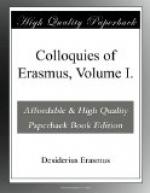Eu. It may be objected, that this Colloquy of Tully’s was but a Fiction.
Ch. It is all one to me, whether the Honour of these Expressions be given to Cato, who thought and spoke them, or to Cicero, whose Mind could form such divine Things in Contemplation, and whose Pen could represent such excellent Matter in Words so answerable to it; though indeed I am apt to think that Cato, if he did not speak these very Words, yet that in his familiar Conversation he us’d Words of the very same Import. For indeed, M. Tully was not a Man of that Impudence, to draw Cato otherwise than he was. Beside, that such an Unlikeness in a Dialogue would have been a great Indecorum, which is the thing chiefly to be avoided in this Sort of Discourse; and especially, at a Time when his Character was fresh in the Memories of all Men.
Th. That which you say is very likely: But I’ll tell you what came into my Mind upon your Recital. I have often admired with myself, that considering that all Men wish for long Life, and are afraid of Death; that yet, I have scarce found any Man so happy, (I don’t speak of old, but of middle-aged Men); but that if the Question were put to him, whether or no, if it should be granted him to grow young again, and run over the same good and ill Fortune that he had before, he would not make the same Answer that Cato did; especially passing a true Reflection upon the Mixture of Good and Ill of his past Life. For the Remembrance even of the pleasantest Part of it is commonly attended with Shame, and Sting of Conscience, insomuch that the Memory of past Delights is more painful to us, than that of past Misfortunes. Therefore it was wisely done of the ancient Poets in the Fable of Lethe, to represent the Dead drinking largely of the Waters of Forgetfulness, before their Souls were affected with any Desire of the Bodies they had left behind them.




